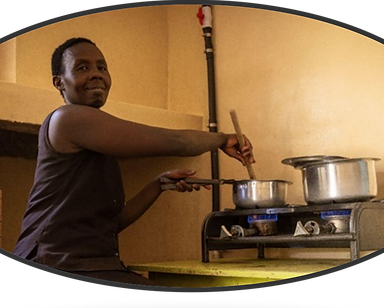Project
Overview
COUNTRY: Uganda
LOCATION: Multiple districts across Uganda
INDUSTRY FOCUS: Clean energy, renewable energy solutions
WANA Energy Solutions aims to provide accessible clean cooking and lighting energy solutions through a hybrid energy approach. The initiative combines LPG gas systems and solar energy solutions to address the critical issues of indoor air pollution and deforestation while making clean energy accessible to rural communities. Operating for 16 years, the project has successfully impacted 465,000 people across 15 districts in Uganda.

Problem Statement
In Uganda, the widespread use of traditional cooking fuels like firewood and charcoal has led to severe health issues, particularly chronic bronchitis among women, and contributes significantly to deforestation. The country loses approximately 20,000 people annually due to health issues caused by traditional fuels. Additionally, over 1.6 billion people globally lack access to electricity, highlighting the urgent need for clean, accessible energy solutions.
Solution
WANA implements a comprehensive hybrid energy approach combining Smart Gas Metering Systems, Solar Home Systems, and Pay-As-You-Cook technology. The solution integrates Internet of Things (IoT) technology to provide affordable, reliable, and efficient clean energy. Their approach includes LPG distribution systems and solar energy solutions, making clean energy accessible through innovative payment models.
Project Stages
The project has evolved significantly since 2008, progressing from serving 45 initial customers to reaching 93,000 households. Key developments include establishing 25 branches nationwide, implementing solar home systems, and expanding LPG distribution networks. The current phase focuses on scaling operations to reach 150,000 households with LPG systems and installing Solar Home Systems in 3,000 households by 2024.
Impact
The project has achieved significant environmental and social impacts, including saving millions of trees and improving household economics with annual savings of $300 per household when switching to LPG and Electric Pressure Cookers (EPCs). The initiative has enhanced community health outcomes by providing clean cooking alternatives and created employment opportunities through a network of 46 staff members and 27 permanent delivery personnel.
Stakeholders
-
UN Foundation
-
Stanford Seed
-
Unreasonable Institute
-
Various strategic partners in the energy sector
Funding
Total Investment Needed: $1,500,000
Breakdown of Investment:
-
Double Burner Stoves: $55,000
-
Solar Home Systems: $160,800
-
Solar Fridges: $720,000
-
Cylinders (Various Sizes): $259,500
-
Electric Pressure Cookers: $272,600
-
Working Capital: $32,100
Historical Funding:
-
Total Revenue and Funding Raised: $4.8M since inception
-
Current Investment Round: Seeking $1.5M in debt and quasi-equity
.png)



